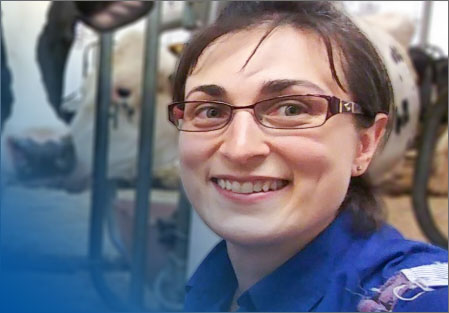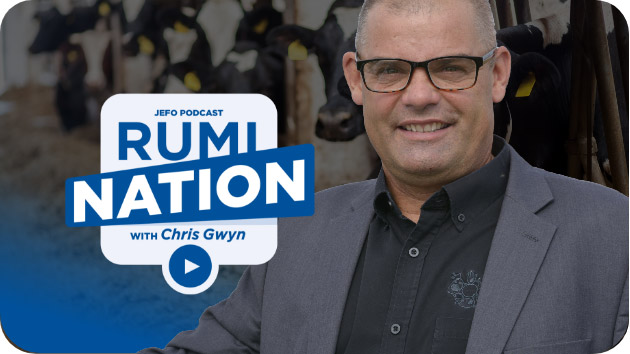RumiNation | S05 : E02
B Vitamins and Trace Minerals in Transition Cow Nutrition
Brought to you by Jefo Nutrition
Share now!
Did you enjoy this episode?
Share now!
Our guest - Dr. Mélissa Duplessis
Dr. Duplessis holds a Ph. D. degree in Animal Sciences from Université Laval during which she did an internship at Cornell University, NY, USA. She was also a postdoctoral researcher at Agriculture and Agri-Food Canada, where her work included defining the needs of dairy cows with regard to B vitamins. She now works as a research scientist in dairy production at the Sherbrooke Research and Development Center of Agriculture and Agri-Food Canada in 2020 and is currently working on developing knowledge to help nutrition advisors and dairy producers with regard to trace minerals and vitamin B nutrition of dairy cows.

Timestamps & Summary
Vicky Brisson (02:24)
Can you please explain why and how cows may benefit from an increased supply of B vitamins?
Dr. Mélissa Duplessis
I’m going to focus on two B vitamins, folate and vitamin B12, as these two vitamins have been extensively studied by our research group […]
Christiane Girard, who has tremendously increased the knowledge on B vitamins in dairy cows, demonstrated that plasma folate and vitamin B12 concentrations were at their lowest at calving and in early lactation, respectively.
[…] a few studies were conducted in order to evaluate the effects of supplementation in folic acid and vitamin B12 during the transition period and in early lactation on dairy cows’ health and performance. […] some showed a substantial increase in milk yield without affecting dry matter intake and plasma indicators of reserve mobilization. And some showed a decrease in plasma indicators of reserve mobilization without affecting dry matter intake and milk yield. […]
Vicky Brisson (05:19)
From a practical perspective, how can we ensure that the cows actually receive an adequate increased supply of B vitamins?
Dr. Mélissa Duplessis
One way is indeed to supplement B vitamins to the animals. Also, previous studies demonstrated that ruminal synthesis of B vitamins is affected by the cow diet and dry matter intake. Thus, it can be suggested that if ruminal synthesis is greater, this will benefit the cow as more B vitamins are available for absorption. Now, can we formulate a diet that optimizes B vitamin ruminal synthesis? It’s a great question. […]Vicky Brisson (06:53)
Your recently published papers collected data on mineral nutrition. Can you share with our audience what were the main findings of your study?
Dr. Mélissa Duplessis
We collected data on 100 Eastern Canadian dairy herds in order to compare dietary trace minerals in commercial settings to NRC recommendations. […]
[…] we observed that cobalt was fed at 405% over the recommendation, copper at 52% over the recommendation, manganese at 372 percent over the recommendation, and for zinc, it was 65% over the recommendation. This is important to note that these data represent the median, meaning that 50% of dairy herds were well above that. […]
Vicky Brisson (08:51)
How would a nutritionist use this knowledge to better balance minerals in their rations?
Dr. Mélissa Duplessis
First of all, forages are not routinely analyzed for trace mineral concentrations due to analysis constraints. Also, absorption coefficients of trace minerals are low. In a recent […], we obtained that more than 60% of nutritionists had intentionally formulated diets above trace mineral recommendations to ensure cow health and optimized reproduction performance. However, this is not clear in the literature that overfeeding trace minerals actually has benefits on cow health and reproduction. […]
Vicky Brisson (10:55)
Can you explain to our audience what is a living lab?
Dr. Mélissa Duplessis (11:03)
Living labs are open innovation ecosystems in real-life environments. […] Prior to the start of the project, producers and researchers should meet and discuss to create a sustainable project.
Vicky Brisson (11:45)
You recently concluded a project using the Living Lab approach, can you share what you did and what you learned so far?
Dr. Mélissa Duplessis
Five dairy herds close to Lake Saint Pierre […] to obtain an assessment of trace mineral usage and the impact of trace mineral concentration in the ration on trace neural excretion in the manure and also urine in milk. […] We observed that dietary trace minerals concentrations are a mirror of trace minerals in manure.
Vicky Brisson (13:10)
Can you share three take-home messages with our audience about practical applications to trace minerals and B vitamin nutrition?
Dr. Mélissa Duplessis
First, micronutrients such as B vitamins and trace minerals play a major role in metabolism.
Research showed that folic acid and vitamin B12 supplementation helps dairy cows to cope with challenges during the transition period.
And the last point I want to stress is that there is a tendency for trace mineral overfeeding, although most research does not support the benefits.







